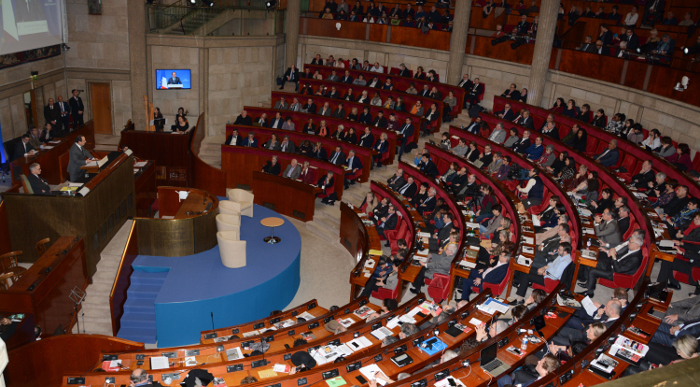Plenary Session at the Economic, Social and Environmental Council in Paris on February 14, 2017

“Thirty years fighting poverty: now what?”
In order to celebrate the 30th anniversary of Joseph Wresinski’s report, Chronic Poverty and a Lack of Basic Security, adopted by the Economic, Social, and Environmental Council (CESE) of the French Government in 1987, a plenary session was organised in Palais D’Iéna on Tuesday the 14th of February 2017. The session, lead by council member Marie-Claire Martel, was marked by numerous interventions, including that of French President Francois Hollande, who spoke of the fundamental role of the Government in the fight against poverty.
Other speakers included trade union leaders and civil society groups who stressed their involvement in this lengthy battle, tracing the evolution of that collaboration over these last thirty years, each focusing on their own speciality and with Wresinski’s report as a common reference point.
Michael Lonsdale read monographs from the report accompanied by a cellist, a harpist, and a singer from the Jubiléo ensemble. This intervention shed light not only on the personal dimension of the problems addressed by the report, but also on their striking relevancy.


Play with YouTube
By clicking on the video you accept that YouTube drop its cookies on your browser.
It was followed by three round table discussions measuring the various impacts of the report in terms of social rights (housing, health, social protection, education and culture), human economy (work, employment, environment), and national, European and international policy.
Finally, these interventions and discussions reached a draft resolution presented by the president of the Council. Mr. Patrick Bernasconi who underlined the necessity to go “beyond mere commemoration” and to “deliberately take action on the theme of chronic poverty.” He noted that it was the first time that a resolution emerged from the CESE in its entirety rather than from a particular working section of it, which emphasized the importance and urgency of the subject.
The resolution reiterated the need to evaluate public policies at all levels, from local to international, with regards to access to fundamental rights of the most vulnerable populations with due regard to equal dignity for all and with the objective of eradicating chronic poverty.
The resolution was adopted by vote almost unanimously (with one abstention). The vote was followed by three responses:
- First, five pupils of the Lycée Le Corbusier d’Aubervilliers (Salma Chaoui, Gaye Diawara, Maïsa Hammami, Ahmed Benali and Massena Benaichouche) who stated that they were there to testify not about poverty but about solidarity, speaking about the various joint initiatives they knew in Aubervilliers and showing their support and hope that these initiatives, alongside others, might lead to a society without poverty or exclusion.
- Second, Gilles Pécout, the Rector of Paris, applauded the secondary school pupils.
- Third, Mrs Aminata Koné, President of the social affairs section of the CESE, drew attention to the importance of education and youth initiatives in the fight against poverty.
This resolution reaffirmed the importance of the fight against chronic poverty first presented in the Wresinski Report in 1987. The Wresinski report gave rise to great advances – such as the RMI/RSA, the Framework Act on Measures to Combat Exclusion, and the enforceable right to housing amongst others- but the battle is not over. If the commemoration is justified it is only as inspiration to look towards the future.
In the light of this, the intervention from the five secondary school students from Aubervilliers was particularly pertinent. They reminded the audience of the importance of acting in the present for the future. By giving concrete, local and current examples of actions of solidarity, they reiterated the urgency of the fight, but also the immense potential and resources of youth when faced with poverty.

